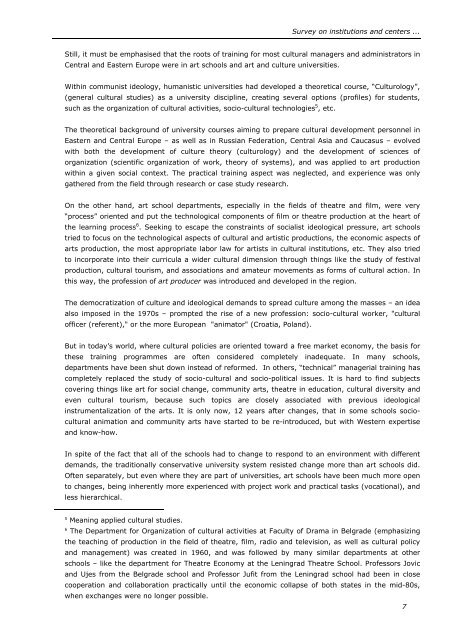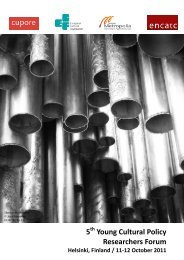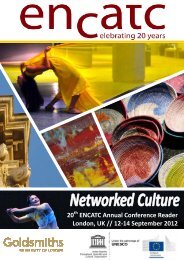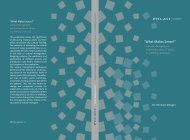Training in cultural policy and management: international ... - Encatc
Training in cultural policy and management: international ... - Encatc
Training in cultural policy and management: international ... - Encatc
Create successful ePaper yourself
Turn your PDF publications into a flip-book with our unique Google optimized e-Paper software.
Survey on <strong>in</strong>stitutions <strong>and</strong> centers ...<br />
Still, it must be emphasised that the roots of tra<strong>in</strong><strong>in</strong>g for most <strong>cultural</strong> managers <strong>and</strong> adm<strong>in</strong>istrators <strong>in</strong><br />
Central <strong>and</strong> Eastern Europe were <strong>in</strong> art schools <strong>and</strong> art <strong>and</strong> culture universities.<br />
With<strong>in</strong> communist ideology, humanistic universities had developed a theoretical course, “Culturology”,<br />
(general <strong>cultural</strong> studies) as a university discipl<strong>in</strong>e, creat<strong>in</strong>g several options (profiles) for students,<br />
such as the organization of <strong>cultural</strong> activities, socio-<strong>cultural</strong> technologies 5 , etc.<br />
The theoretical background of university courses aim<strong>in</strong>g to prepare <strong>cultural</strong> development personnel <strong>in</strong><br />
Eastern <strong>and</strong> Central Europe – as well as <strong>in</strong> Russian Federation, Central Asia <strong>and</strong> Caucasus – evolved<br />
with both the development of culture theory (culturology) <strong>and</strong> the development of sciences of<br />
organization (scientific organization of work, theory of systems), <strong>and</strong> was applied to art production<br />
with<strong>in</strong> a given social context. The practical tra<strong>in</strong><strong>in</strong>g aspect was neglected, <strong>and</strong> experience was only<br />
gathered from the field through research or case study research.<br />
On the other h<strong>and</strong>, art school departments, especially <strong>in</strong> the fields of theatre <strong>and</strong> film, were very<br />
“process” oriented <strong>and</strong> put the technological components of film or theatre production at the heart of<br />
the learn<strong>in</strong>g process 6 . Seek<strong>in</strong>g to escape the constra<strong>in</strong>ts of socialist ideological pressure, art schools<br />
tried to focus on the technological aspects of <strong>cultural</strong> <strong>and</strong> artistic productions, the economic aspects of<br />
arts production, the most appropriate labor law for artists <strong>in</strong> <strong>cultural</strong> <strong>in</strong>stitutions, etc. They also tried<br />
to <strong>in</strong>corporate <strong>in</strong>to their curricula a wider <strong>cultural</strong> dimension through th<strong>in</strong>gs like the study of festival<br />
production, <strong>cultural</strong> tourism, <strong>and</strong> associations <strong>and</strong> amateur movements as forms of <strong>cultural</strong> action. In<br />
this way, the profession of art producer was <strong>in</strong>troduced <strong>and</strong> developed <strong>in</strong> the region.<br />
The democratization of culture <strong>and</strong> ideological dem<strong>and</strong>s to spread culture among the masses – an idea<br />
also imposed <strong>in</strong> the 1970s – prompted the rise of a new profession: socio-<strong>cultural</strong> worker, "<strong>cultural</strong><br />
officer (referent)," or the more European "animator" (Croatia, Pol<strong>and</strong>).<br />
But <strong>in</strong> today’s world, where <strong>cultural</strong> policies are oriented toward a free market economy, the basis for<br />
these tra<strong>in</strong><strong>in</strong>g programmes are often considered completely <strong>in</strong>adequate. In many schools,<br />
departments have been shut down <strong>in</strong>stead of reformed. In others, “technical” managerial tra<strong>in</strong><strong>in</strong>g has<br />
completely replaced the study of socio-<strong>cultural</strong> <strong>and</strong> socio-political issues. It is hard to f<strong>in</strong>d subjects<br />
cover<strong>in</strong>g th<strong>in</strong>gs like art for social change, community arts, theatre <strong>in</strong> education, <strong>cultural</strong> diversity <strong>and</strong><br />
even <strong>cultural</strong> tourism, because such topics are closely associated with previous ideological<br />
<strong>in</strong>strumentalization of the arts. It is only now, 12 years after changes, that <strong>in</strong> some schools socio<strong>cultural</strong><br />
animation <strong>and</strong> community arts have started to be re-<strong>in</strong>troduced, but with Western expertise<br />
<strong>and</strong> know-how.<br />
In spite of the fact that all of the schools had to change to respond to an environment with different<br />
dem<strong>and</strong>s, the traditionally conservative university system resisted change more than art schools did.<br />
Often separately, but even where they are part of universities, art schools have been much more open<br />
to changes, be<strong>in</strong>g <strong>in</strong>herently more experienced with project work <strong>and</strong> practical tasks (vocational), <strong>and</strong><br />
less hierarchical.<br />
5 Mean<strong>in</strong>g applied <strong>cultural</strong> studies.<br />
6 The Department for Organization of <strong>cultural</strong> activities at Faculty of Drama <strong>in</strong> Belgrade (emphasiz<strong>in</strong>g<br />
the teach<strong>in</strong>g of production <strong>in</strong> the field of theatre, film, radio <strong>and</strong> television, as well as <strong>cultural</strong> <strong>policy</strong><br />
<strong>and</strong> <strong>management</strong>) was created <strong>in</strong> 1960, <strong>and</strong> was followed by many similar departments at other<br />
schools – like the department for Theatre Economy at the Len<strong>in</strong>grad Theatre School. Professors Jovic<br />
<strong>and</strong> Ujes from the Belgrade school <strong>and</strong> Professor Jufit from the Len<strong>in</strong>grad school had been <strong>in</strong> close<br />
cooperation <strong>and</strong> collaboration practically until the economic collapse of both states <strong>in</strong> the mid-80s,<br />
when exchanges were no longer possible.<br />
7






